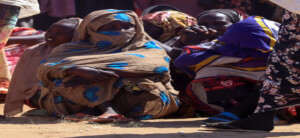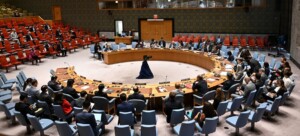120 US Congress members call on President Obama to keep Sudan humanitarian crisis a high priority
Yesterday, a bipartisan group of 120 members of Congress called on President Obama to re-prioritize peace, accountability and protection of civilians in Sudan during his final year in office.
Yesterday, a bipartisan group of 120 members of Congress called on President Obama to re-prioritize peace, accountability and protection of civilians in Sudan during his final year in office.
The bipartisan letter is led by Congressmen Jim McGovern (D-MA) and Joseph Pitts (R-PA),co-chairs of a bipartisan Congressional human rights commission, and the co-chairs of the bipartisan Sudan and South Sudan Issues Caucus: Representatives Michael McCaul (R-TX), Mike Capuano (D-MA), Barbara Lee (D-CA), and Jeff Fortenberry (R-NE). In the letter, the lawmakers call for strong U.S. leadership and advocacy on the grave abuses and humanitarian crisis that persist and continue to worsen in Sudan.
Rep. Jim McGovern (D-MA) said: “As the violence in Sudan grows worse, the world is looking to the United States to be a strong partner in the effort to build a lasting peace and address this devastating humanitarian crisis. Today in Sudan, families are being displaced, hunger and malnutrition have reached crisis levels, and civilians face the constant threat of aerial bombings. With today’s letter, our bipartisan coalition is calling on President Obama to make Sudan a top priority by taking new steps to protect the Sudanese people and put an end to this violent conflict.”
Rep. Joseph Pitts (R-PA) said: “We must not allow the conflict in Sudan to vanish from our collective memory. The Sudanese government is purposely withholding aid from conflict regions, brandishing starvation as a weapon. Children in Darfur suffer from advanced stages of malnourishment, as food insecurity in the city is at emergency levels— one step below famine. My colleagues and I wrote to the Obama Administration today to encourage the President to keep the protection of human rights in Sudan at the forefront of his agenda in the last year of his presidency. One of the most powerful weapons we enjoy, as a nation, is the effective use of our influence; now is the time to wield it. The Administration must step forward and provide leadership to the international community in continuing to center its attention on this conflict."
Rep. Mike Capuano (D-MA) said: “Tragically, the people of Sudan are still living in fear, enduring an ongoing humanitarian crisis in a region where murder and violence are commonplace. Millions of people have fled their homes and many are facing starvation. Circumstances are dire and we urge the Administration to enhance its advocacy for the people of Sudan.”
Rep. Michael McCaul (R-TX) said: “The ongoing tragedy in Darfur is heartbreaking. Every day innocent men, women, and children suffer atrocities including rape and murder and millions more are in need of life-saving aid. The United States must do more to help the people of Sudan. We can accomplish this by isolating the Sudanese government with economic sanctions such as designating Sudanese gold as ‘conflict gold’ and by holding countries such as India and Saudi Arabia accountable for allowing Sudanese President Omar Al-Bashir to travel freely without arresting him in accordance with the International Criminal Court. The administration must act now to help stop the violence and protect the Sudanese people."
Rep. Barbara Lee (D-CA) said: “Tragically, the violence in Sudan is escalating daily. Millions of people have been displaced, food insecurity is rampant and violence continues unchecked. Today, I’m joining more than 100 of my colleagues in asking President Obama to prioritize building peace and stability in Sudan. Through sustained diplomacy and high-level engagement, the U.S. has an opportunity to make a difference in Sudan and in the lives of the Sudanese people.”
The full text of the letter to President Obama:
Dear Mr. President,
Darfur has not gone away. As you know, the crisis has spread to other parts of Sudan, particularly South Kordofan and Blue Nile, as lifesaving aid has been blocked and aerial bombardments have targeted civilians and their crops exacerbating an already dire humanitarian crisis. Across Sudan severe human rights abuses continue.
Public and media attention may have waned, but the suffering of civilians has not. We urge you to enhance the U.S. approach to this conflict, and re-prioritize peace, accountability, and protection of civilians in Sudan in your last year in office.
We appreciate the efforts you have made with the Sudanese government to address and resolve the crisis in South Sudan, and the recent opening of Sudanese southern borders is a welcome development. Such engagement, valuable on its own merits, must not preclude or overshadow the need for strong U.S. leadership and advocacy on the grave abuses and humanitarian crisis that persist and continue to worsen inside Sudan itself.
Today, over 5 million people are in need of life-saving aid across Sudan including at least 1.5 million who have been continually displaced since the Darfur genocide began in 2003. Violence has intensified in recent years, with at least half a million people newly displaced in the last two years. USAID’s Famine Early Warning System reports almost 4 million people at crisis levels of food insecurity and warns of increased food insecurity in 2016. In Darfur, U.N. agencies report extreme levels of child malnutrition, and in some parts of South Kordofan, food insecurity may reach emergency levels, just one level below famine. While we welcome the fact that the United States remains the largest supplier of humanitarian aid to Sudan, those efforts are hollow if that aid cannot get to the people who need it most, or if the conflict continues to rage on indefinitely.
The Government of Sudan is directly responsible, bombing civilian targets and blocking or delaying both life-saving aid and supplies for UN peacekeepers. This intransigence is well documented. Violations of UN Security Council Resolutions including the ongoing bombing of civilians are consistently reported by the UN Panel of Experts. Nuba Reports, a local group of journalists reporting from within Sudan, has documented over 4,000 bombs dropped on civilian targets in South Kordofan and Blue Nile since 2012.
The United States has a number of ways that it can help influence the behavior of the Sudanese regime through the use of financial tools at its disposal. We urge the Obama Administration to enhance the current sanctions regime so that is focused to impact the calculations of the Sudanese regime’s top-level officials, by targeting top level officials, financial institutions and other facilitators of the conflict. Similarly, the U.S. should utilize the good relations that the U.S has with countries in the Arab world that support Khartoum financially, to pressure countries like Qatar and Saudi Arabia, which are investing in Sudan and lending the regime money, to turn off the spigot until true reform and change occurs on the ground.
Additionally, we urge the administration to counter gold as a major source of funding for the conflict in Sudan, allowing it to continue its atrocities. Please prioritize efforts to encourage industry associations to designate Sudan’s gold as conflict-affected. Gold has emerged as a top revenue earner for the Sudanese government after the secession of South Sudan deprived the regime of oil proceeds. The bulk of this gold is mined in the conflict region of Darfur and its extraction bears the hallmarks of grave human rights abuses. Penalizing the trade in Sudanese gold can help deprive the regime of a major source of revenue for its war machinery.
Sudanese President Omar Al-Bashir continues to travel with near impunity despite arrest warrants from the International Criminal Court on charges of war crimes, crimes against humanity, and genocide. This includes visits to India, Saudi Arabia, and South Africa with no apparent consequences. The lack of accountability has emboldened the Government of Sudan. Despite the documented uptick in violence and displacement the Government of Sudan has announced plans for dismantling displacement camps and has been demanding the removal of UN peacekeepers.
The United States can make a difference in Sudan by making it more difficult for the regime to continue to wage war against its own population. With sustained urgent attention and multilateral efforts, the United States can significantly contribute toward peace, accountability, and protection of civilians in Sudan. The genocide in Darfur is an issue you championed as a Senator and as you came into office as President.
The current situation in Darfur and throughout Sudan requires sustained efforts at the very highest level of our government. Now, as much as ever, the people of Sudan need you to be a champion today.
***
In addition to the six bipartisan co-leads, the letter was also signed by House Foreign Affairs Committee Ranking Member Eliot Engel (D-NY) and Representatives Eleanor Holmes Norton (D-DC) , Alcee Hastings (D-FL), John Lewis (D-GA), Danny Davis (D-IL), Yvette Clarke (D-NY), Raúl Grijalva (D-AZ), Gwen Moore (D-WI), André Carson (D-IN), Krysten Sinema (D-AZ), Maxine Waters (D-CA), Sheila Jackson Lee (D-TX), Michael Doyle (D-PA), Earl Blumenauer (D-OR), Joe Crowley (D-NY), Randy Weber (R-TX), Greg Meeks (D-NY), Charlie Rangel (D-NY), Stephen Lynch (D-MA), John Yarmuth (D-KY), Peter Welch (D-VT), Donald Payne, Jr.(D-NJ), Jim McDermott (D-WA), Gerald Connolly (D-VA), Suzanne Bonamici (D-OR), Peter DeFazio (D-OR), John Conyers, Jr. (D-MI), Carolyn Maloney (D-NY), Tim Huelskamp (R-KS), Robin Kelly (D-IL), Sanford Bishop, Jr. (D-GA), Donna Edwards (D-MD), Ted Lieu (D-CA), Corrine Brown (D-FL), David Cicilline (D-RI), Seth Moulton (D-MA), Julia Brownley (D-CA), Sam Farr (D-CA), Bonnie Watson Coleman (D-NJ), Anna Eshoo (D-CA), Bobby Rush (D-IL), Katherine Clark (D-MA), Hank Johnson, Jr. (D-FL), Mark DeSaulnier (D-CA), Eddie Bernice Johnson (D-TX), Hakeen S. Jeffries (D-NY), Chellie Pingree (D-ME), Bill Flores (R-TX), Alan Lowenthal (D-CA), Betty McCollum (D-MN), Dina Titus (D-NV), Elijah Cummings (D-MD), Donald Beyer, Jr. (D-VA), Cedric Richmond (D-LA), Brenda Lawrence (D-MI), Ryan Costello (R-PA), Karen Bass (D-CA), Jan Schakowsky (D-IL), Chris Van Hollen (D-MD),Barbara Comstock (R-IA), Daniel Lipinski (D-IL), David Scott (D-GA), Emanuel Cleaver (D-MO), Frank Pallone (D-NJ), Al Green (D-TX), Joyce Beatty (D-OH), Frederica Wilson (D-FL), Tom Emmer (R-MN), Brad Sherman (D-CA), Chaka Fattah (D-PA), William Keating (D-MA), Steve Israel (D-NY), Brian Higgins (D-NY), James Clyburn (D-SC), Daniel Donovan, Jr (R-NY)., Sean Patrick Maloney (D-NY), Steny Hoyer (D-MD), Bill Pascrell, Jr. (D-NJ), Wm. Lacy Clay (D-MO), Albio Sires (D-NJ), Lloyd Doggett (D-TX), Norma Torres (D-CA), Ted Deutch (D-FL), Michael Honda (D-CA), Rosa DeLauro (D-CT), Richard Neal (D-MA), Luis Gutierrez (D-IL), Thomas Rooney (R-FL), Jim Costa (D-CA), Kathleen Rice (D-NY), Marc Veasey (D-TX), Matt Cartwright (D-PA), Bobby Scott (D-VA), Mark Pocan (D-WI), Lois Capps (D-CA), Rick Larsen (D-WA), Jim Langevin (D-RI), Michelle Lujan Grisham (D-NM), Pete Visclosky (D-IN), Stacey Plaskett (D-VI), Zoe Lofgren (D-CA), Nita Lowey (D-NY), Sander Levin (D-MI), Tim Murphy (R-PA), Jerrold Nadler (D-NY), Adam Schiff (D-CA), John Garamendi (D-CA), David Price (D-NC), Dan Kildee (D-MI), John Delaney (D-MD), Alma Adams (D-NC), Judy Chu (D-CA), Dave Loebsack (D-IA), and Marcia Fudge (D-OH).











 and then
and then